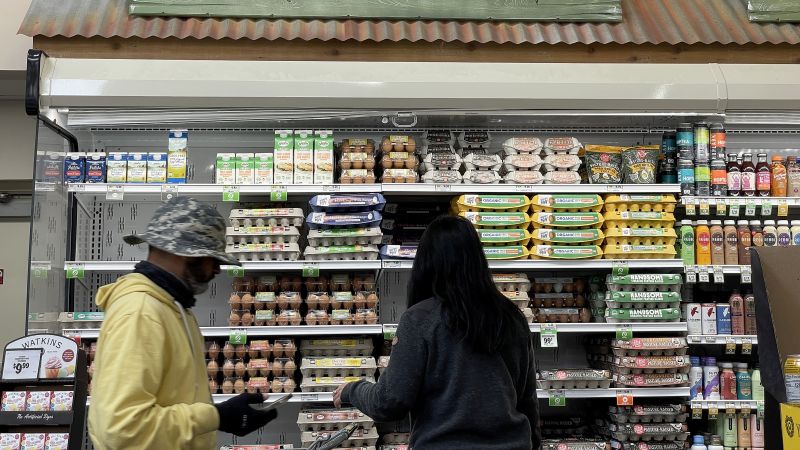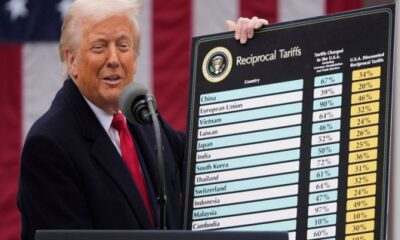Washington, DC
CNN
—
Spending at US retailers fell in March as consumers pulled back after the banking crisis fueled recession fears.
Retail sales, which are adjusted for seasonality but not for inflation, fell by 1% in March from the prior month, the Commerce Department reported on Friday. That was steeper than an expected 0.4% decline, according to Refinitiv, and above the revised 0.2% decline in the prior month.
Investors chalk up some of the weakness to a lack of tax returns and concerns about a slowing labor market. The IRS issued $84 billion in tax refunds this March, about $25 billion less than they issued in March of 2022, according to BofA analysts.
That led consumers to pull back in spending at department stores and on durable goods, such as appliances and furniture. Spending at general merchandise stores fell 3% in March from the prior month and spending at gas stations declined 5.5% during the same period. Excluding gas station sales, retail spending retreated 0.6% in March from February.
However, retail spending rose 2.9% year-over-year.
Smaller tax returns likely played a role in last month’s decline in retail sales, along with the expiration of enhanced food assistance benefits, economists say.
“March is a really important month for refunds. Some folks might have been expecting something similar to last year,” Aditya Bhave, senior US economist at BofA Global Research, told CNN.
Credit and debit card spending per household tracked by Bank of America researchers moderated in March to its slowest pace in more than two years, which was likely the result of smaller returns and expired benefits, coupled with slowing wage growth.
Enhanced pandemic-era benefits provided through the Supplemental Nutrition Assistance Program expired in February, which might have also held back spending in March, according to a Bank of America Institute report.
Average hourly earnings grew 4.2% in March from a year earlier, down from the prior month’s annualized 4.6% increase and the smallest annual rise since June 2021, according to figures from the Bureau of Labor Statistics. The Employment Cost Index, a more comprehensive measure of wages, has also shown that worker pay gains have moderated this past year. ECI data for the first quarter of this year will be released later this month.
Still, the US labor market remains solid, even though it has lost momentum recently. That could hold up consumer spending in the coming months, said Michelle Meyer, North America chief economist at Mastercard Economics Institute.
“The big picture is still favorable for the consumer when you think about their income growth, their balance sheet and the health of the labor market,” Meyer said.
Employers added 236,000 jobs in March, a robust gain by historical standards but smaller than the average monthly pace of job growth in the prior six months, according to the Bureau of Labor Statistics. The latest monthly Job Openings and Labor Turnover Survey, or JOLTS report, showed that the number of available jobs remained elevated in February — but was down more than 17% from its peak of 12 million in March 2022, and revised data showed that weekly claims for US unemployment benefits were higher than previously reported.
The job market could cool further in the coming months. Economists at the Federal Reserve expect the US economy to head into a recession later in the year as the lagged effects of higher interest rates take a deeper hold. Fed economists had forecast subdued growth, with risks of a recession, prior to the collapses of Silicon Valley Bank and Signature Bank.
For consumers, the effects of last month’s turbulence in the banking industry have been limited so far. Consumer sentiment tracked by the University of Michigan worsened slightly in March during the bank failures, but it had already shown signs of deteriorating before then.
The latest consumer sentiment reading, released Friday morning, showed that sentiment held steady in April despite the banking crisis, but that higher gas prices helped push up year-ahead inflation expectations by a full percentage point, rising from 3.6% in March to 4.6% in April.
“On net, consumers did not perceive material changes in the economic environment in April,” Joanne Hsu, director of the surveys of consumers at the University of Michigan, said in a news release.
“Consumers are expecting a downturn, they’re not feeling as dismal as they were last summer, but they’re waiting for the other shoe to drop,” Hsu told Bloomberg TV in an interview Friday morning.
This story has been updated with context and more details.





































